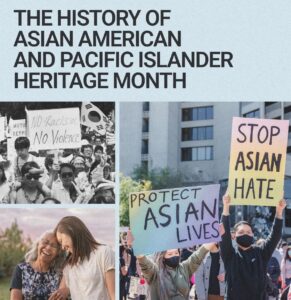Exploring the Rich History of Asian American and Pacific Islander Heritage Month
A month isn’t enough to cover the history and impact of the millions of people who identify as AAPI. There are 20.6 million people in the U.S. who identify as AAPI—over 6% of the total population, and their cultures, contributions, and challenges deserve to be recognized.
What is AAPI Heritage Month?
- Asian American and Pacific Islander Heritage Month (or AAPI Heritage Month) celebrates people in the United States who are of Asian, Pacific Islander, and Native Hawaiian descent.
- The AAPI umbrella term includes cultures from the entire Asian continent—including East, Southeast, and South Asia—and the Pacific Islands of Melanesia, Micronesia, and Polynesia. (History).
- There is no single story of the AAPI experience but rather a multitude of heritages and cultures that are continually cultivated, making up a tapestry of diverse experiences and histories.
- Many in the AAPI community also consider this month of May a chance to raise awareness about the unique challenges the AAPI community faces.
How AAPI Heritage Month began
AAPI Heritage Month started as a weeklong celebration of Asian American and Pacific Islander people and culture under President Jimmy Carter in 1978. It was extended to a monthlong celebration in the 1990s.
The month of May was chosen to commemorate both the first Japanese immigration to the U.S., which took place in 1843, and the 1869 completion of the transcontinental railroad, a project that owed its success to the many Chinese, Japanese, and Korean workers who labored on it.
In the 1970s, other heritage weeks and celebrations were already being officially observed in the United States. Between the Civil Rights Movement and the countless other movements for social justice, there was an increasing push for the government to recognize the rights of minority groups in the U.S., celebrate their cultures, and ensure their well-being.
Representatives Frank Horton and Norman Mineta, along with Senator Daniel Inouye, introduced the idea of an AAPI heritage week in Congress in 1977, but both resolutions initially failed. It took another year for the resolution to be pushed through.
Jeanie Jew was the congressional staffer who had first brought the idea to Rep. Horton, after witnessing the lack of Asian representation during the country’s 1976 bicentennial celebrations and drawing on her own family history of an ancestor who was killed in the destruction of San Jose’s Chinatown in 1887.
Activists and movement leaders have raised valid criticisms of AAPI Heritage Month.
Some have highlighted that AAPI Heritage Month does little to advance the community’s interests in the way other heritage months do. While striving to celebrate these cultures, AAPI Heritage Month can have a tokenizing effect, as the collapse of Asian Americans, Native Hawaiians, and Pacific Islanders into one group fails to articulate and address the breadth of complexity and the concerns of each individual group.
Many activist groups and thought leaders urge the general public to participate in the celebration and recognition of AAPI people and cultures in ways that extend long past the month of May and, in so doing, avoid making short-term tokens of the AAPI people in our communities.
A few ways to celebrate AAPI Heritage Month
This year’s theme is “Advancing Leaders Through Opportunity,” as chosen by the Federal Asian Pacific American Council—a nonprofit that supports the interests of Asian Americans, Native Hawaiians, and Pacific Islanders in the federal and D.C. governments. Here are a few ways you can participate in AAPI Heritage Month events to honor and celebrate AAPI culture:
-
- Get involved with the movement to #StopAAPIHate by taking bystander trainings.
- Advocate for AAPI rights at a local level.
- Support AAPI creators.
- Support business owners by shopping and dining at local AAPI stores and restaurants.
- Understand that AAPI people are not a monolith. There are countless unique traditions, cultures, and experiences that make up the AAPI community.
The post Exploring the Rich History of Asian American and Pacific Islander Heritage Month appeared first on MoveOn: People-Powered Progress.

